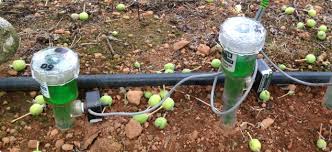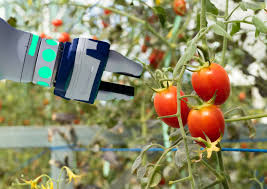8 Important AgriTech Solutions Which Nigerian Farmers Should Invest into Scale Production and Increase Profitability
Agricultural technology or agrotechnology (abbreviated as AgriTech, or agrotech) is the use of technology in agriculture, horticulture, and aquaculture with the aim of improving yield, efficiency, and profitability. Put simply it is the application of technology to improve all elements of the farming and growing process. The application of agritech can be to grow more food from less space or using less water. It can be the use of robots to replace manual labor for planting or picking crops. It can also be the use of big data, machine learning, and AI to understand more about the soil or growing conditions to improve yield. Agritech can be deployed to better the funding, planting, rearing, storage, and sales of agricultural produce to mention a few. It is important to note that agritech solutions could be any services, applications, or products aimed at specific aspects of agriculture in order to improve processes. For a solution to be considered as agritech, it has to solve specific and major problems in the agriculture sector such as lack of information, insufficient financial support, market access, transportation challenges, and so on. From leveraging Artificial Intelligence (AI) to helping farmers better manage potential risks, establishing farmer platforms, business-to-business (B2B) agriculture market places, rural fintechs, post-harvest technologies, and precision agriculture, the agritech sector is brimming with so many potentials in Nigeria – and our teeming farmers must be educated on how to take advantage of these solutions.
If you are a farmer or intending farmer, it is important for you to study up AgriTech Solution as such knowledge will broaden your horizon. However, in this article, I intend to walk you through some of the popular AgriTech Solutions in Nigeria to get you started on the journey of curiosity along the subject line – and help you to start thinking about how these solutions might help you do better in your career as a farmer. So, let’s look at a few of them.
- Soil Sensor (Remote Sensing)
An example of agritech in action is a soil sensor to measure moisture content and moisture flow. We all know that plants need water to grow. But plants get stressed if they have too little water or too much water. So, one of the purposes of the soil sensor is to get the farm watering right. With the right amount of water, the farmer can achieve an optimum balance between crop growth and water usage.
 8 Important AgriTech Solutions Which Nigerian Farmers Should Invest into Scale Production and Increase Profitability
8 Important AgriTech Solutions Which Nigerian Farmers Should Invest into Scale Production and Increase Profitability
Placing a smart sensor in the soil can communicate back to the farmer about soil conditions at any one time, which could be hourly, daily, or on-demand. The sensor can also measure many more attributes of the soil at the same time, meaning the farmer can have a more holistic view of the soil quality. By placing three sensors below each other in the soil, the farmer can identify how water runs through the soil from the top to the root. With these sensors, the farmer can quickly identify how far and how deep the water is percolating through the soil. If the water collects below the surface but above the root, then it means the roots may not be getting the nutrition.
- Robotics & Automation
Advanced robotics and automated machinery are crucial to increasing the efficiency of agricultural production in the future. Automated large machinery can take over many aspects of large-scale farming. A new generation of precision robotic manipulators can locate and identify produce, select, and pick it based on its size and degree of ripeness.
 8 Important AgriTech Solutions Which Nigerian Farmers Should Invest into Scale Production and Increase Profitability
8 Important AgriTech Solutions Which Nigerian Farmers Should Invest into Scale Production and Increase Profitability
- Internet of Things (IoT)
Sensor technologies and monitoring solutions integrate into the existing farming process (mechanization) to generate precision data for the daily decision-making of farmers and agricultural businesses. This real-time data provides the basis for automation systems to trigger action and tracks the effectiveness of automation systems for future improvement.
- Biotechnology
Biotechnology is also referred to as genetic engineering and the process of improving the genes of a given crop. In most cases, genetic engineering is carried out to increase the resistance of certain crops to farm inputs such as the application of herbicides. Through biotechnology, farmers can plant on areas that were otherwise considered dry or deserts. “Reduced farm inputs” implies that the farmers can as well save some costs on-farm resources.
Read Also: 7 Business you can start with ZERO Capital in Nigeria
- Farm machines
The introduction of combined harvesters and planters is a major gain for farmers of the modern age. Production and time are some of the important elements in agriculture as it is important to plant early and harvest in time, as well as ensure that the yield is stored within the right time. The use of modern technology in agriculture ensures that farmers grow vast food within the shortest time possible.
- GPS Technology
GPS technology has been used in the development of autopilot sprayers and tractors that do not require any driver. Such technology is important in agriculture in that it promotes better and more efficient farming practices. For example, the autopilot tractors and sprayers are equipped with tracking systems that eliminate human error and, in the end, save on fuel and equipment. Drones and satellites measure and monitor fields, create terrain maps, control the quality of tillage & sowing works, and provide a large amount of phyto-geomorphological data for optimal farming management. For example, hyperspectral cameras mounted on drones show water and fertilizer use, crop yield as well as the emergence of pests, ultimately aiding in addressing these issues early while ensuring more yield.
- Vertical Farming
Vertical Farm Technology or simply Vertical Farming, a component of urban agriculture, is the practice of producing food in vertically stacked layers. This offers many advantages. Perhaps the most obvious is the ability to grow within urban environments and thus have fresher foods available faster and at lower costs. However, vertical farming won’t be limited to just urban environments like initially expected. Farmers in all areas can use it to make better use of available land and to grow crops that wouldn’t normally be viable in those locations. By adopting controlled-environment agriculture, vertical farming stacks layers of plants vertically to produce food/medicine on vertically inclined surfaces or in alternative structures such as shipping containers, skyscrapers, and rooftops. With integrated sensor solutions and automation, it can precisely control environmental variables in the growth environment for optimized usage of space, energy, water, and other input factors.
- Weather Tracking
Although we still make jokes about our local meteorologists, the truth is that computerized weather modeling is becoming increasingly sophisticated. There are online weather services that focus exclusively on agriculture, and farmers can access these services on dedicated onboard and handheld farm technology but also via mobile apps that run on just about any consumer smartphone. This technology can give farmers enough advanced notice of frost, hail, and other weather that they can take precautions to protect the crops or at least mitigate losses to a significant degree.
In conclusion, modern agricultural technology hopes to achieve among others, two important goals – a profitable economy and better output. However, in order to achieve these goals, farmers need to understand the concept of modern farming and the use of technology. Technology is transforming nearly every aspect of our modern lives, and farming is no exception. The produce on your table tonight will have gotten there faster, fresher, and more cost-effectively thanks to leading-edge technology in agriculture. With the trends we are already seeing around, we can safely predict that Agriculture Technology will become even more computerized in the decades ahead, and we should expect amazing transformations in the agricultural space.
Hope you enjoy this article?
Share your thoughts in the comment session.
Contact us today for your business consultancy and business advisory services. We can help you fine-tune your idea, structure your business, market your business, train your staff, consult on your retirement plan, coach you for financial success. We also write a business plan and help with fundraising strategies and Grant applications. We can help you start, grow, and expand your business.
Call or WhatsApp us now on 081 0563 6015, 080 7635 9735, 08113205312 or send an email to dayohub@gmail.com and we will solve any of your business problems.
Related